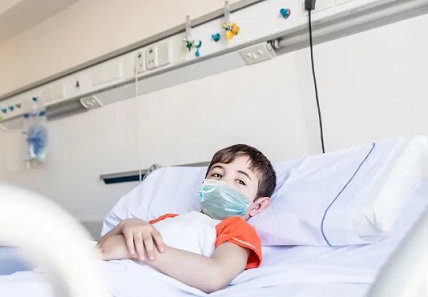Nikhil Prasad Fact checked by:Thailand Medical News Team Jul 06, 2024 1 year, 5 months, 2 weeks, 2 days, 3 hours, 6 minutes ago
COVID-19 News: COVID-19, primarily known as a respiratory illness, has revealed a surprising range of symptoms affecting various parts of the body. Recent findings show that children might experience a rare but significant condition known as terminal ileitis, an inflammation of the terminal ileum - the last part of the small intestine. This condition is commonly associated with Crohn’s disease or bacterial infections but is now being linked to COVID-19.
 COVID-19 Can Cause Terminal Ileitis In Children
What is Terminal Ileitis?
COVID-19 Can Cause Terminal Ileitis In Children
What is Terminal Ileitis?
Terminal ileitis refers to the inflammation of the terminal ileum. This inflammation can cause abdominal pain, diarrhea, and other gastrointestinal symptoms. While it is usually related to diseases like Crohn’s or infections from bacteria like Yersinia or Salmonella, recent cases suggest that COVID-19 can also cause this condition.
Case Studies Highlight the Issue
Researchers from the Regional Hospital St. Johann in Tirol, Austria, and the Medical University of Innsbruck, Austria recently reported cases studies that are covered in this
COVID-19 News report, of terminal ileitis in children caused by COVID-19.
Case One: A Nine-Year-Old Boy
In March 2023, a nine-year-old boy with no prior health issues was admitted to the hospital with fever, abdominal pain, and diarrhea. Initial tests ruled out appendicitis. Further imaging revealed significant terminal ileitis. The boy tested positive for the Omicron variant of COVID-19 (XBB.1.5). Despite the severity of his symptoms, he recovered quickly with supportive care, including fluids and pain management, without the need for antibiotics. He was discharged three days later and made a full recovery.
Case Two: A 16-Month-Old Boy
Around the same time, a 16-month-old boy was admitted with high fever and bloody diarrhea. Tests revealed a co-infection with Campylobacter jejuni, a common bacterial cause of gastrointestinal illness, and the Omicron variant of COVID-19 (XBB.1.9). The toddler was treated with intravenous fluids and supportive care. His condition improved without antibiotics, and he was discharged after five days.
Understanding the Link
Both cases underscore that COVID-19 can present with symptoms beyond the typical respiratory issues. In children, gastrointestinal symptoms such as abdominal pain and diarrhea might be the only signs of COVID-19. Terminal ileitis, though rare, highlights the virus’s ability to affect multiple body systems.
Why This Matters
These cases emphasize the importance of considering a wide range of potential causes when diagnosing abdominal pain in children during the COVID-19 pandemic. Comprehensive testing, including for COVID-19, is crucial to ensure accurate diagnosis and appropriate treatment.
Differential Diagnosis
Diagnosing terminal ileitis can be challenging because its symptoms overlap with other common pediatric illnesses like appendicitis or bacterial infections. Therefore, it’s crucial for doctors to consider a broad range of potential causes and perform comprehensive testing.
The Role of ACE-2 Receptors
COVID-19 affects the body by binding to ACE-2 receptors, which are present not only in the lungs but also in the gastrointestinal tract. This explains why some patients, including children, experience significant GI symptoms. These receptors allow the virus to enter and infect cells, causing inflammation and other symptoms.
Comprehensive Testing is Key
In both highlighted cases, comprehensive microbiological workups were essential. These tests helped identify not only COVID-19 but also other potential infections, ensuring that the children received appropriate care. In the second case, the detection of Campylobacter jejuni alongside SARS-CoV-2 highlighted the importance of not overlooking co-infections.
Recovery and Outlook
Both children recovered well with supportive care, demonstrating that while COVID-19 can cause severe symptoms, children generally have good outcomes with appropriate treatment. These cases add to the growing understanding of how COVID-19 can manifest differently in children compared to adults.
Takeaway for Parents and Caregivers
Parents should be aware that COVID-19 can cause a variety of symptoms in children, not just respiratory ones. If your child develops unusual gastrointestinal symptoms, especially during a COVID-19 outbreak, consider seeking medical advice to rule out COVID-19 and other infections. Early and accurate diagnosis is key to effective treatment and recovery.
Conclusion
COVID-19 continues to surprise us with its wide range of symptoms and effects on different parts of the body. For children, gastrointestinal manifestations like terminal ileitis, although rare, are a reminder of the importance of vigilance and comprehensive medical evaluation during this ongoing pandemic.
The study findings were published in the peer reviewed journal: Microorganisms.
https://www.mdpi.com/2076-2607/12/7/1377
For the latest
COVID-19 News, keep on logging to Thailand Medical News.
Read Also:
https://www.thailandmedical.news/news/understanding-covid-19-s-impact-on-children-s-brains-insights-from-a-three-year-study
https://www.thailandmedical.news/news/breaking-japanese-doctors-warn-of-cerebrospinal-fluid-leakage-linked-to-covid-19-in-children
